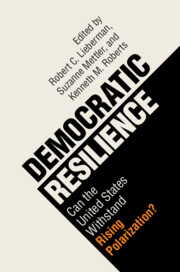Book contents
- Democratic Resilience
- Democratic Resilience
- Copyright page
- Dedication
- Contents
- Figures
- Tables
- Contributors
- Acknowledgments
- Part I Why Might Polarization Harm Democracy?
- Part II Political Institutions in Polarized Times
- Part III Social Polarization and Partisanship
- Part IV Vicious Circles? The Relationship between Polarized Behavior and Institutions
- Part V Can Political Action Save Democracy in Polarized Times?
- 14 Elections, Polarization, and Democratic Resilience
- 15 Citizen Organizing and Partisan Polarization from the Tea Party to the Anti-Trump Resistance
- Index
14 - Elections, Polarization, and Democratic Resilience
from Part V - Can Political Action Save Democracy in Polarized Times?
Published online by Cambridge University Press: 20 November 2021
- Democratic Resilience
- Democratic Resilience
- Copyright page
- Dedication
- Contents
- Figures
- Tables
- Contributors
- Acknowledgments
- Part I Why Might Polarization Harm Democracy?
- Part II Political Institutions in Polarized Times
- Part III Social Polarization and Partisanship
- Part IV Vicious Circles? The Relationship between Polarized Behavior and Institutions
- Part V Can Political Action Save Democracy in Polarized Times?
- 14 Elections, Polarization, and Democratic Resilience
- 15 Citizen Organizing and Partisan Polarization from the Tea Party to the Anti-Trump Resistance
- Index
Summary
Elections are at the core of democratic politics. We rely on them to perform the vital tasks of organizing and aggregating preferences, of determining leadership, of instituting accountability, of regulating conflict, and – more amorphous but no less important – of regenerating a broadly shared sense that the institutions and persons who govern us do so legitimately. As “moments of heightened citizenship” they focus the collective attention of the public on questions of who should be delegated governing authority and to what end it should be dedicated. They are among the only moments in which “the people” is allowed to speak authoritatively in its collective capacity, and the rituals surrounding them positively affirm community ties while also marking out its boundaries of exclusion.
- Type
- Chapter
- Information
- Democratic ResilienceCan the United States Withstand Rising Polarization?, pp. 343 - 368Publisher: Cambridge University PressPrint publication year: 2021
- 2
- Cited by

